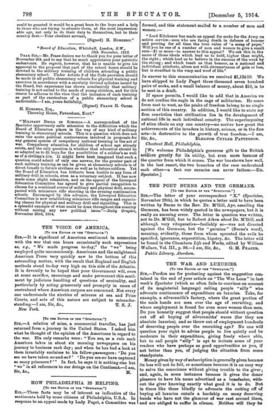"Board of Education, Whitehall, London, S.W., 19th November, 1914.
DRAB SIR,—Mr. Pease desires me to thank you for your letter of November 9th and to say that he much appreciates your patriotic endeavours. He regrets, however, that he is unable to give his approval to the proposal that part of the school hours should be devoted to the military training of children attending a public elementary school. Under Article 2 of the Code provision should be made in all public elementary schools for physical training and exercises in accordance with a carefully devised syllabus issued by the Board, but experience has shown conclusively that military training is not suited to the needs of young children, and for this reason he adheres to the view that the inclusion of such training as part of the curriculum of a public elementary school is undesirable.—I am, yours faithfully, (Signed) FRANK H. OATES. H. HORDERN, Esq.,
Throwley House, Faversham, Kent."
"Mnrreay DRILL ne SCHOOLS.—A correspondent of the Spectator opportunely calls attention to the difficulties which the Board of Education places in the way of any kind of military training in elementary schools. This is a question which does not raise the acute political controversies involved in proposals for any general system of compulsory national training in the art of war. Compulsory education for children of school age already exists, and the only question is whether that education should be so adapted as to fit boys for the possibilities of a soldier's as well sa of a civilian's life. It might have been imagined that such a question could admit of only one answer, for the greater part of such military training as can be given at elementary schools is of direct benefit to future civilians as well as to future soldiers. Yet the Board of Education has hitherto been hostile to any form of military drill in schools, even as a voluntary subject. It has now made some slight relaxation, and on the appeal of the Liverpool Education Committee has agreed to give partial recognition to classes for a combined course of military and physical drill, accom- panied with miniature rifle shooting in the evening continuation schools. Encouraged by this advance, the Liverpool Education Committee is now establishing miniature rifle ranges and organiz- ing classes for physical and military drill and signalling. This is a splendid example of what could be done throughout the country without raising any new political issue."—Daily Graphic, November 23rd, 1914.


























































 Previous page
Previous page